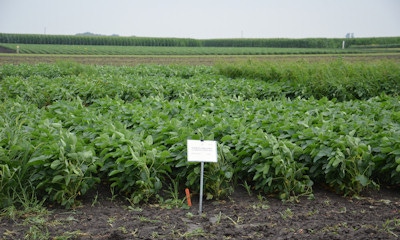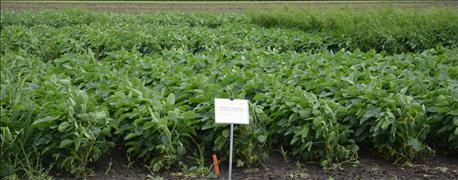
The Environmental Protection Agency approved planting of dicamba-resistant soybeans in late winter. Until now the only farmers growing them were those working through companies to grow seed for the next season. So will you consider growing them this season?

DICAMBA-RESISTANT SOYBEANS UNDER TEST: Here are dicamba-resistant soybeans under test in BASF plots in east-central Illinois. BASF is one of the companies awaiting approval for herbicides to apply over dicamba-resistant soybeans.
There is a catch. In the long run, Monsanto, who moved the trait into soybean varieties, hopes the answer will be for better weed control, and as an option to help developing further disease resistance. However, the EPA has not approved use of herbicides containing dicamba on these soybeans. Purdue University Extension weed scientists Bill Johnson and Travis Legleiter issued this statement. “Current labels of all the dicamba herbicide products do not allow dicamba to be used in these new soybean varieties…there are no labels for any dicamba-containing product that allow applications at soybean planting (preemergence) or after the soybean crop has emerged (postemergence).
They add: “It is very unlikely that we will be able to use dicamba-containing products on these varieties during the 2016 growing season. Without an approved label, applying a dicamba-containing product to these soybean varieties would constitute a violation of both state and federal laws. Additionally, some elevators have indicated they will not accept grain produced from dicamba-resistant soybeans until the stacked trait obtains approval by the European Union. The statement by Johnson and Legleiter appeared in the first edition of the Purdue Crops & Pest Newsletter for 2016.
So why would you consider growing them this year?
1. The weed control program should be useful in the future
You could get a feel for the varieties now. Both Johnson and Legleiter note that this new herbicide-resistant technology can be a useful weed management tool. They imply it will be in the future since they make it clear they don’t expect approvals to come in time to use the herbicide on these soybeans this year.
2. Compare yield potential of these varieties to non-resistant varieties already in your line-up
Kevin Cavanaugh, director of research at Beck’s, says some farmers may want ot plant dicamba-resistant soybeans to see how they stack up yield-wise compared to varieties they are already growing. Claims by those developing the genetics indicate that the new trait has been placed in elite genetics. It’s a chance to see how they yield on your farm, even if you can’t use the herbicide on them. Beck’s is offering varieties with this trait this year.
3. Get a look at other traits of these varieties now
Consider it sort of a sneak peek. Most agronomists don’t recommend planting extensive acreage of a variety you haven’t grown before right out-of-the-gate. These are new varieties, so it is your first opportunity to observe how they perform, not only for yield, but other traits, including lodging, time of flowering and so forth.
About the Author(s)
You May Also Like




